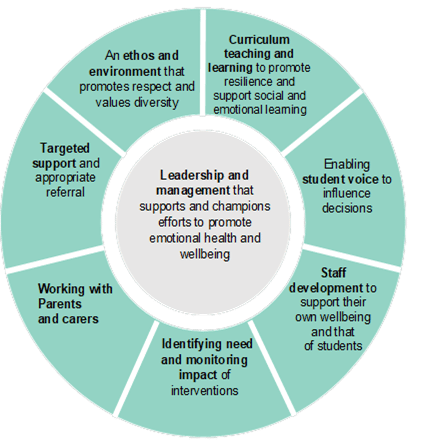In 2015, The Children and Young People’s Mental Health Coalition worked with Public Health England to produce the first ever guidance document for education settings on implementing a whole school or college approach to mental health and wellbeing.
Six years on and we have seen many developments within children and young people’s mental health support. We have seen rising mental health need and we have lived through Covid-19 pandemic, which has presented many challenges to children and young people. In response, increased support has been made available in education settings through Mental Health Support Teams and the Relationship and Sex Education and Health Education curriculum (RSHE).
Given these changes, the time felt right to refresh the whole school or college approach guidance to ensure that schools and colleges had the best available information to successfully implement such approaches. We are proud to have partnered with Public Health England and the Department for Education to provide an update to the guidance, drawing on the extensive expertise and knowledge of our members.
The document was updated to reflect changes in policy context, national prevalence data, the school inspection framework, sources of support and the impact of the Covid-19 pandemic.
What is a Whole School or College Approach?
A whole school or college approach means creating a school and college culture and environment where mental health and wellbeing is both promoted and protected, and this applies to all pupils and students, teachers and staff members. There are 8 key principles that make up such an approach.
The 8 principles of a whole school or college approach
The 8 principles include:
- Leadership and management: Effective leadership and management that champions efforts to promote mental health and wellbeing to ensure whole school and college approaches are embedded.
- Curriculum, teaching and learning: The curriculum can be used to promote resilience and support social and emotional learning. This can be through a dedicated RSHE curriculum, and the wider curriculum through lessons such as PE and art.
- Student voice: Enabling student voice to influence decisions is crucial in ensuring children and young people feel part of the school and college community.
- Staff development: A strong focus on staff development is vital in settings demonstrating their commitment to staff health and wellbeing.
- Identifying need and monitoring impact: Identifying need and monitoring impact enables education settings to understand pupils’ mental health and wellbeing needs and respond effectively to these.
- Working with parents and carers: The family plays a key role in influencing children and young people’s mental health and wellbeing so education settings should seek to communicate with them as much as possible.
- Targeted support: Schools and colleges have a role to play in providing targeted support and specialist provision for those with particular mental health and wellbeing needs.
- Ethos and environment: Pupils and staff spend a lot of time in the school and college environment, so it is crucial that the environment is nurturing and respectful. Relationships between staff and pupils are also critical.
What is in the guidance?
The guidance provides schools and colleges with further information on how to develop mental health and wellbeing practices that support all of their pupils and staff, using the 8 principles as a framework to do this. These principles are outlined in the guidance document, alongside examples of practice and questions to help school and college leaders to consider how they can implement each principle effectively in their setting.
The document also signposts to resources to support implementation covering government guidance and advice, training for education staff, curriculum support, and resources for young people, parents and carers.
Why is such an approach important?
We know that education settings can play a vital role in promoting mental health and wellbeing and that good mental health is important for helping children and young people develop and thrive. Taking whole school and college approaches have been found to lead to improved emotional health and wellbeing in children and young people.
As we recover from the Covid-19 pandemic, it is vital that mental health and wellbeing is a priority within education recovery. A commitment to fully implementing whole school or college approaches across all education settings should be a critical part of this.
Author: Charlotte Rainer






